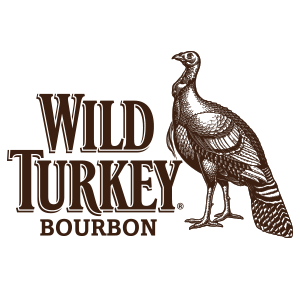Wild Turkey (bourbon)
Wild Turkey is a brand of Kentucky straight bourbon whiskey distilled and bottled by the Wild Turkey Distilling Co, a division of Campari Group. The distillery is located near Lawrenceburg, Kentucky. It offers a range of bourbons, rye whiskeys, and other spirits. Wild Turkey is known for its deep, rich, and full-bodied flavor, which is attributed to its high rye content and the use of a traditional sour mash process. The brand has a storied history, with roots tracing back to the 19th century, making it one of the iconic names in American whiskey.
History[edit | edit source]
The origins of Wild Turkey date back to the 1860s when the Ripy brothers opened their distillery on Wild Turkey Hill near Lawrenceburg, Kentucky. The brand name "Wild Turkey" was reportedly adopted in the 1940s after a distillery executive shared some of his whiskey on a wild turkey hunting trip, and the name stuck due to its popularity among the hunting party. Over the decades, Wild Turkey has grown in popularity, becoming synonymous with quality bourbon whiskey.
In 1980, the brand was purchased by Pernod Ricard, and later, in 2009, it was acquired by the Campari Group, a major player in the global spirits industry. Under Campari, Wild Turkey has expanded its product line and global reach, while maintaining its commitment to traditional bourbon-making practices.
Production[edit | edit source]
Wild Turkey is produced using a high-rye mash bill, which contributes to its bold and spicy flavor profile. The distillery uses a sour mash process, where a portion of the previous batch's mash (known as "backset") is used in the fermentation of the new batch. This method helps maintain a consistent pH level and contributes to the bourbon's distinctive taste.
After fermentation, the whiskey is distilled and then aged in new, charred American oak barrels. Wild Turkey's aging process takes place in warehouses situated on a deep limestone shelf on the Kentucky River. The limestone naturally filters the water used in the distillation process, adding to the whiskey's unique flavor. The brand is also known for its longer-than-average aging period, which allows for a more developed and mature flavor profile.
Products[edit | edit source]
Wild Turkey offers a variety of products, including:
- Wild Turkey 101: The flagship bourbon of the brand, known for its high proof and rich flavor. - Wild Turkey Rye: A spicy and robust rye whiskey that showcases the high-rye content of Wild Turkey's mash bill. - Rare Breed: A barrel-proof bourbon that is a blend of 6-, 8-, and 12-year-old stocks, offering a complex and powerful flavor. - Russell's Reserve: A premium line of bourbons and ryes, named after master distiller Jimmy Russell and his son Eddie Russell, who have over 100 years of combined experience in whiskey making.
Cultural Impact[edit | edit source]
Wild Turkey has made its mark not only in the world of spirits but also in popular culture. It has been featured in films, literature, and music, often symbolizing rugged American authenticity. The brand's commitment to traditional distilling methods and its rich history have earned it a loyal following among whiskey enthusiasts.
See Also[edit | edit source]
| This article is a stub. You can help WikiMD by registering to expand it. |
Search WikiMD
Ad.Tired of being Overweight? Try W8MD's NYC physician weight loss.
Semaglutide (Ozempic / Wegovy and Tirzepatide (Mounjaro / Zepbound) available. Call 718 946 5500.
Advertise on WikiMD
|
WikiMD's Wellness Encyclopedia |
| Let Food Be Thy Medicine Medicine Thy Food - Hippocrates |
Translate this page: - East Asian
中文,
日本,
한국어,
South Asian
हिन्दी,
தமிழ்,
తెలుగు,
Urdu,
ಕನ್ನಡ,
Southeast Asian
Indonesian,
Vietnamese,
Thai,
မြန်မာဘာသာ,
বাংলা
European
español,
Deutsch,
français,
Greek,
português do Brasil,
polski,
română,
русский,
Nederlands,
norsk,
svenska,
suomi,
Italian
Middle Eastern & African
عربى,
Turkish,
Persian,
Hebrew,
Afrikaans,
isiZulu,
Kiswahili,
Other
Bulgarian,
Hungarian,
Czech,
Swedish,
മലയാളം,
मराठी,
ਪੰਜਾਬੀ,
ગુજરાતી,
Portuguese,
Ukrainian
Medical Disclaimer: WikiMD is not a substitute for professional medical advice. The information on WikiMD is provided as an information resource only, may be incorrect, outdated or misleading, and is not to be used or relied on for any diagnostic or treatment purposes. Please consult your health care provider before making any healthcare decisions or for guidance about a specific medical condition. WikiMD expressly disclaims responsibility, and shall have no liability, for any damages, loss, injury, or liability whatsoever suffered as a result of your reliance on the information contained in this site. By visiting this site you agree to the foregoing terms and conditions, which may from time to time be changed or supplemented by WikiMD. If you do not agree to the foregoing terms and conditions, you should not enter or use this site. See full disclaimer.
Credits:Most images are courtesy of Wikimedia commons, and templates, categories Wikipedia, licensed under CC BY SA or similar.
Contributors: Prab R. Tumpati, MD





